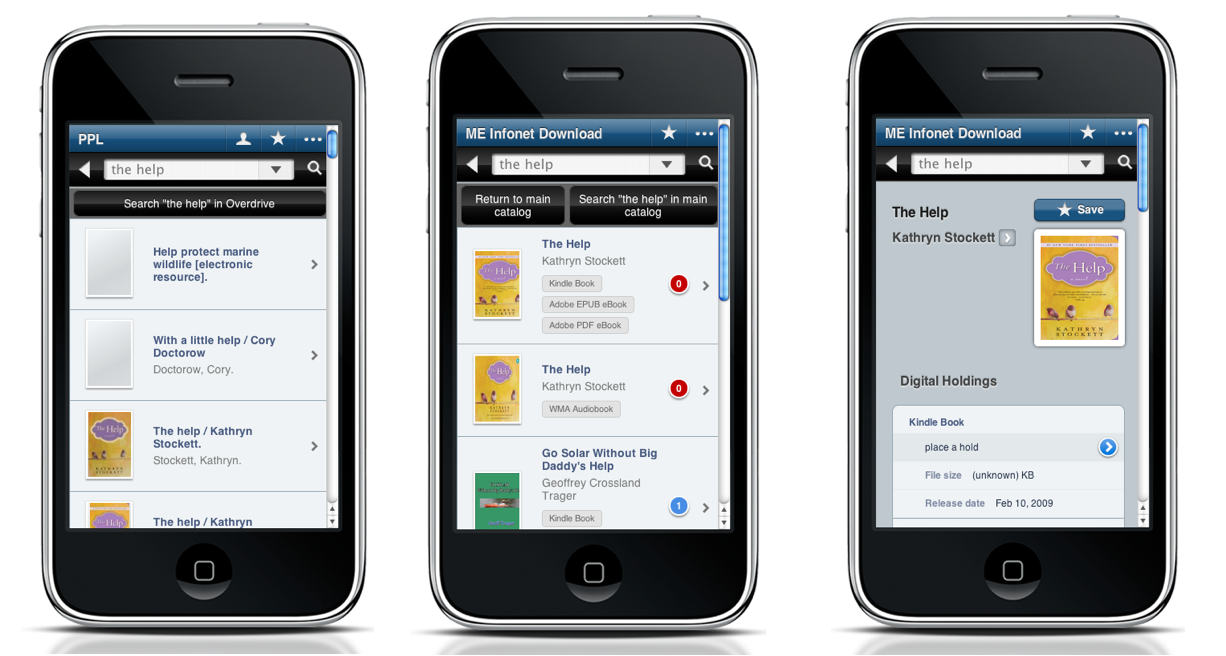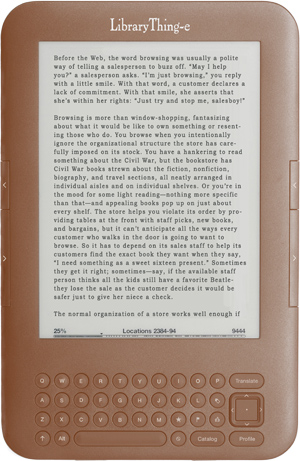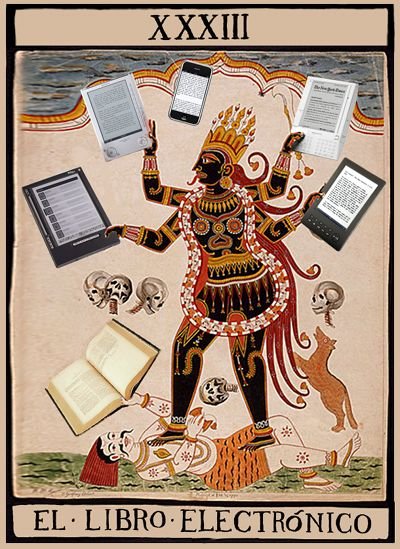
This month LibraryThing is pleased to catch up with Michael Tamblyn, the CEO of Rakuten Kobo, a Canadian ebook, audiobook and ereader company doing business in 150 countries. Tamblyn serves on the board of OverDrive, an ebook distributor working with both the non-profit and retail sectors; is involved with AGE-Well, a Canadian organization dedicated to developing technology and services for healthy aging; and is the founder of BookNet Canada, a “non-profit organization that develops technology, standards, and education to serve the Canadian book industry.”
What drew you to the book business and book technology?
I always loved bookstores. The small town where I grew up had a pretty standard books+cards+stationary store, but I thought it was fantastic and I began bugging the owner for a job at 11 or 12. He was a bookseller of the old school, wore three piece suits to work retail, and had absolutely no need of an urchin to work in his store. Fast forward 8 or 9 years, I’m working my way through a university degree in music, cooking at a restaurant that was attached to the iconic Canadian indy store, The Bookshelf. The store manager stuck his head in the door of the kitchen and said there was an opening in the bookstore and if anyone was interested, now was the time to speak up. I had just had a very timely conversation with one of my music instructors that went something like “If you get burned or cut working in a kitchen, you’re out of the program. You don’t get 2 months off to rehab an injury; you’re just out.” That got me into the store. Fast forward another couple of years, I have graduated with my music degree, so of course I’m still working in the bookstore. But I didn’t love stocking shelves, and we were just reading about this startup in Seattle that had just left the garage and was selling books online. I thought “We could definitely do this,” and the store owner agreed, so we gathered a little group together and started the first online bookstore in Canada, bookshelf.ca, next door to the store in the storage space of a gift basket company next door. It was 1995-ish. Since then, most of the jobs I’ve had have been where books, business and technology crash into each other.
You were part of the team that founded Kobo in 2009. What was your vision for Kobo, and what sets the company apart?
I was CEO of BookNet Canada when ebooks first started to gather momentum. We launched one of the first conferences on digitization, TechForum, and that was where Mike Serbinis gave one of the first presentations of this app that they had created, called Shortcovers. Indigo was backing it, and it was one of the purest examples I have ever seen of a retailer tackling the innovator’s dilemma head-on. They built something that threatened their core business and put their smartest people on it to make it work. Maybe a month after, they asked if I wanted to join to head up the sales and content sides of the business – ecommerce, publishers, authors, and anything else that needed a home. I had been running BookNet for six years, together with an incredible group of people, and it was one of those “don’t look, just leap” moments. I joined a company in a basement that was selling maybe 25 books a day.
But the vision was crystal clear: this is the start of a transformation in reading. No one, deep down in their hearts, believes that we are still going to be chopping down trees and pressing ink into them 50 years from now to do our reading. So a change is coming. The only questions are “how quickly” and “who will make it happen?” What I had learned from bookshelf.ca and Indigo is that you can compete successfully against really big companies. Canada isn’t like the US – Amazon hasn’t washed away all domestic competition, online or in-store. If you are focused, have some serious up-front investment, and pick your battles carefully, you can dance between the elephants’ feet. So while Amazon, Apple, Barnes & Noble and Google were all fighting each other for control of the U.S. market, we started building out businesses in every single other country that looked like it needed an ebook solution. We partnered with retailers like Indigo who saw ebooks coming, wanted a solution that would let them maintain connection with their customers, and were looking for someone who could help them compete. And it worked. Now if you look around the world, Amazon really only dominates a couple of markets for ebooks — the US and the UK. Everywhere else, it’s a real fight – France, Germany, Netherlands, Spain, Italy, Australia, New Zealand, Portugal, on and on. And in most of those markets, there is a bookseller partnered with Kobo who is keeping their marketshare, going toe-to-toe with the biggest tech companies in the world. It’s pretty fantastic.
For some time now it has been in the public mind that there is a competitive, perhaps even antagonistic relationship between digital and print media. Do you share this view? What do you think the future of book publishing will look like, when it comes to print vs. ebooks?
There will always be print books. There are some books that are just beautiful objects. I would say this is a tempest-in-a-teapot issue made up of 1/3 economics, 1/3 aesthetics and 1/3 McLuhan. Publishers make good margin on ebooks, and the physical supply chain has costs that publishers would probably love to say goodbye to. But the print book retail market is much more diverse – chains, Indies, grocery, discount stores – than the ecommerce or ebook business. If I had to guess, I think publishers look at the print world as a hedge, a barrier that keeps a few players from being completely dominant. So they are very careful to support it, maintain it, keep it healthy. That gets wrapped in “I could never let go of paper books! I love the smell of them and the feel of pages against my face…”. That’s an aesthetic stance more than a practical one, one that gets harder to sustain when you hit your 40s, need reading glasses and then find out that it’s really really nice to be able to make the font on a book bigger! There is a never-ending tension in the book business between higher-prices/smaller-audiences (hardcovers, trade paper) and books for the masses (paperbacks, libraries, ebooks, library ebook access). eBooks are just the latest manifestation of books as a mass medium: “How do we get this book to as many people as possible as cheaply as possible?” with all of the usual forces lined up against that impulse.
In a recent article for Forbes, you wrote about the hidden age discrimination in the tech world, that a disinterest in the needs of older consumers is a costly strategic error. What are the long-term benefits of designing with older users in mind?
You can approach it two ways: one is as an issue of accessibility. Anything you do that makes life easier for a sight-impaired person, for a person who has issues with manual dexterity, for a person who can’t lift something that is too heavy, it makes the experience better for everyone. The other is from a market perspective: older adults are the fastest growing demographic in the U.S., in Canada, in the EU. These are countries in the middle of a massive demographic shift. And they, on average, love reading, love books, have disposable income, and have time both to read books and buy them. Being in the book business and not designing for older adults is like being in the boat business but not caring much about motors, sails or oars.
Tell us about your personal library. What’s on your shelves, and what’s on your ereader?
In paper: cookbooks, art books, books that are just made beautifully that make you happy just by picking them up. In digital: everything else. All the fiction, non-illustrated non-fiction, fan fiction, the stuff that you read a review about and go “Oh that sounds cool – I should read that!” Really, everything where the content is more important than the object. I also move around a lot, so having most of my library with me all the time is a massive benefit.
What have you been reading recently, and what would you recommend to others?
I started missing travel about a year ago, so I was tearing through books that took me to places I knew. The Ben Aaronovitch Rivers of London paranormal series took me back to places I knew right down to the brass on the doorknobs. Meet Me In the Bathroom about the NYC music scene of 2000-2010. Layered through that was reading that was coming out of Kobo’s Diversity & Inclusion work: Eric Foner’s incredible books on Reconstruction, P. Djèlí Clark’s Ring Shout, 21 Things You May Not Know About the Indian Act by Bob Joseph (for the Canadians reading this). And then books I have been reading for our podcast Kobo In Conversation: Katie Mack’s The End of Everything (Astrophysically Speaking), Malcolm Gladwell’s The Bomber Mafia. So much good stuff.










